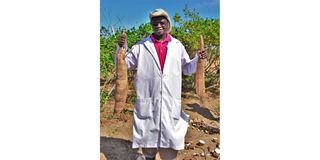New cassava variety to turn around farming

Prof Douglas Miano holds cassava. Researchers in Kenya have developed a disease-resistant cassava variety. PHOTO | POOL
For a long time, cassava has been referred to as a poor man’s food. But, in essence, cassava is rich in carbohydrates, just like maize, and is a good source of vitamin C. Cassava leaves are also nutritious.
Cassava is the second most important food crop after maize at the Coast and Western where it is planted at 30 per cent and 60 per cent respectively. In Eastern, cassava takes 10 per cent of farming.
With a new improved variety about to get to the market, cassava will no longer be a poor man’s diet, but a source of income and food for the majority of farmers who have failed to break even because of diseases.
Cassava has been planted in Kenya for decades but farmers and consumers are yet to get the full benefits of the tuber crop, experts have said.
This is because they have been experiencing losses due to diseases, especially the cassava brown streak disease (CBSD), which leads to loss and or deformation of tubers worth millions of shillings every year.
While the cassava mosaic disease causes a lot of damage to the tubers, it is the CBSD which has been identified as the most lethal and has been subject to several years of research by the Kenya Agricultural and Livestock Research Organisation (Kalro) in collaboration with the VIRCA Plus project.
According to the Food and Agriculture Organization (FAO), the symptoms of CBSD are not obvious and it is hard for inexperienced farmers to know when their crop has been affected, and may not appear “until the cassava plant has stayed longer than nine months”. “CBSD is now occurring in areas that were believed to be unsuitable for it such as high altitude areas away from the Indian coastal belt in Kenya,” states FAO.
But researchers in Kenya have developed a CBSD resistant variety and farmers will no longer be afraid of losing their crop to the disease. “Kenya may become the first country globally to release a genetically modified cassava, said Dr Margaret Karembu, the Director, ISAAA Africenter.



